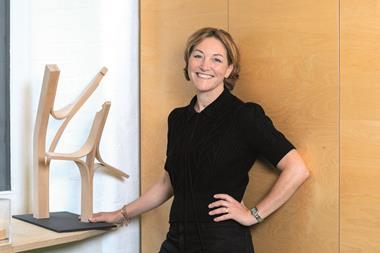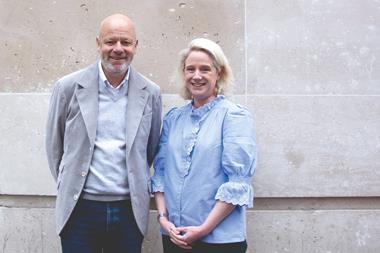Last week, JLL reported stronger-than-expected first-quarter results, but its EMEA business still made a loss. Property Week asked JLL’s UK chief executive Chris Ireland to address the negative perceptions surrounding the firm’s future.

JLL has been doing well globally, but the European arm continues to struggle. What can we take from your Q1 results?
We’ve had an extremely positive start to the year. The Q1 results have put the UK business on track for another robust year of growth. Global real estate markets have carried their strong performance from the latter stages of 2017 into the first few months of 2018, with investment and corporate occupier activity at their highest levels for a decade.
Global real estate transaction volumes for the first quarter of 2018 came in at $165bn (£121bn), 15% higher than the same period last year, with activity underpinned by favourable macro-economic trends in the world’s major economies. Despite growing trade tensions and elevated stock market volatility, investors have remained committed to global property, with first-quarter activity reaching its highest level since Q1 2007.
Our EMEA margin is much better than this time last year and beat our budget estimates, so we’re confident that our plan and strategy is working.
What about the UK specifically?
It’s our policy not to break out our performance country by country, which can cause confusion for some observers. So, I want to be as open and clear as I can about this – the UK business is a major margin and revenue contributor to JLL globally.
Our 2017 UK revenue and margin were significantly up on 2016. Our business is ahead of its targets year to date. Our UK revenue was 9% higher than the previous year and our margin was up 50%. Over the past couple of years, we’ve been making significant investments in our business and they are now starting to pay off.
Last year, we saw incredibly strong performances from our UK capital markets, alternatives, residential, project and development services and leasing businesses. We advised on commercial investment transactions totalling £14.2bn – an increase of more than 40% on the previous year.
“The UK business is a major margin and revenue contributor to JLL globally”
In the business parks sector, JLL advised on around 90% of all UK deals, totalling more than £1.45bn. We also made a significant impact on the UK alternatives sector, advising on 32% of transactions – up from 24% in 2016 – and acting on behalf of all UK student housing market deals.
Our project and development services team delivered projects totalling over 33m sq ft across the UK, while our residential business delivered record revenues, up 15% on 2016. We saw a 30% increase in new development sales activity and a 50% increase in land transactions. Last year, we sold more than £3bn of new-build London residential property, making JLL one of the largest new-build agents in London.
Which areas do you think JLL is performing well in and where is there room for improvement?
So far, this year, nearly all areas of our core UK business are ahead of last year and there are a lot of exciting opportunities for us to align further with our clients.
Investors are allocating more to real estate and occupiers are outsourcing more of their real estate activities. Last year, the UK was the second most active property market in the world and London was the most active city market. We don’t think these fundamentals are going to change and being part of a global business means that we are really plugged into international flows of capital and the needs of fast-growing corporate businesses wherever they are based.
What is your outlook for the business?
While fundamentals remain robust in key global markets, we expect to see investors pursuing real estate through new avenues outside of traditional single-asset acquisitions. The growing prominence of debt financing, M&A activity and alternative sectors all demonstrate that while the way investors access the sector may be shifting, their appetite for real estate has not diminished.
This strength is mirrored in our EMEA capital markets teams, of which the UK is a significant part. They continue to lead the market and their fee revenue for the first quarter increased by more than 50%, year on year.
How does JLL plan to improve the UK and EMEA’s performance?
We have articulated a clear UK business strategy, which takes us through to 2020. Our focus is on organic growth and we are investing in tech and digital innovations, as well as developing our people and workplaces. EMEA first-quarter fee revenue expansion was most notable in capital markets, driven by investment sales in the UK, Germany and France, as well as project and development services across various countries, with contribution from our Tétris fit-out business.
What are the big challenges facing the UK market and JLL – and opportunities?
Tech is both a challenge and an opportunity. We have witnessed lots of tech companies causing disruption and data is undoubtedly enabling new business models. We are focused on getting ahead of the curve in the tech and digital space.
Our NXT Studio is a fantastic example of JLL combining technological innovation with strong and insightful data. Earlier this year, we expanded our proptech capabilities, becoming the first UK agent to launch this state-of-the-art technology that transforms how businesses select new office space, speeding up the process for both occupiers and landlords dramatically.
What about Brexit?
Although the market continues to be impacted by Brexit uncertainty, sentiment towards the UK from global investors remains positive. Around the world investors are attracted to the UK by high levels of transparency, excellent liquidity, favourable leasing conditions and high yields. As a strong global business, we continue to help our clients navigate the market as the Brexit negotiations pan out.

We are in an ideal position to build on our strong first quarter and continue making progress on our journey to improve our profitability. Our UK capital markets teams continue to lead the market and grew their revenue to be number one for sales and acquisitions in the UK. We’re investing to broaden our capital markets business so that we can help investors across the world access the asset class in new and more efficient ways.
One of the reasons for the negative perception of the firm is that JLL appears to have seen more than its fair share of high-profile departures recently. Why is that?

As with any business, over any given period some people will leave and some will join JLL. Over the last six months, we’ve made several key hires, including Ben Tolhurst, head of our UK property and asset management business, and Sue Asprey-Price, who leads our UK corporate solutions team and has also joined our UK Board. More recently, Ian Guthrie joined us as senior managing director of banking and finance to work with our EMEA and UK capital markets teams, residential, hotels and hospitality and financing teams to bring together their expertise to provide real estate investment and finance solutions to clients.
While we have brought in new talent, we are totally committed to creating an environment where the best and the brightest people see opportunities to develop their careers with JLL. This enables us to regularly promote from within our business, delivering continuity and better integrated advice for our clients.
The retail team, in particular, has seen a lot of departures. Why?
The retail sector is going through a dramatic transformation and retailers, investors and agents alike have to react. Over the past 18 months, we have proactively structured our business to help clients deal with the new environment and access the right opportunities that offer real value.
We are market leaders in out-of-town, high street and shopping centre agency and investment and we are the only UK agency with a full research and food service consultancy. We have consolidated ahead of the market and will grow strategically, while other retail agencies are still grappling with these challenges.
Last year, we advised on over £2bn of retail and leisure investment deals, which is close to 25% market share. We have continued strongly in 2018 advising on many market-leading retail transactions and are satisfied with the changes we have made.
You also lost a key City agent, Andrew Hawkins. How close are you to finding a replacement?
Our culture isn’t just about individual performers; it’s also about having the best team of people. The central London capital markets team combines a strength and depth that continues to drive market-leading performance across the central London markets, positioning them to advise on more than £4bn of transactions in 2017.
Under the continued leadership of head of central London capital markets Julian Sandbach, this momentum has continued into 2018. The team transacted £795m in Q1 and is involved in the sale of some the capital’s most prominent buildings.
Many firms are boosting their professional services departments because of their non-cyclical revenues. How about JLL?
Our professional advisory teams are a cornerstone of our UK business. This area is fast changing and we have invested in our digital platforms to help us modernise and ensure the best client interfaces. Our appointment of Ben Tolhurst will help us drive our major digital transformation and customer engagement programmes across this area of our business. Over the past 12 months, we’ve seen a number of significant wins in this space and have been able to renew contracts with strategic clients.
What would a Cushman & Wakefield IPO mean for JLL?
We want to be the best for our clients and our people. I’m very confident that we can achieve our ambitions in this regard. While we are mindful of the competitive environment, our biggest driver is ensuring we adopt and embrace new digital initiatives and focus on the changing needs of our clients. These developments have the potential to have a transformational impact on our business and the service we provide to our clients.
Is the industry ripe for further consolidation?
Change in the industry is inevitable. Our UK strategy is designed to generate sustainable revenue and margins through organic growth. While we monitor market conditions to ensure we remain well positioned to take advantage of the opportunities for our clients, our focus is on continuing to provide them with the very best service and advice.
There has been much criticism of executive pay at JLL. What do you think people will have made of Christian Ulbrich’s 53% pay rise?
One thing people may forget is that from 2016-17, Christian’s job changed – he transitioned from being JLL’s EMEA CEO to being CEO of our global business, including responsibility for LaSalle Investment Management. As with all global executives at a large multinational, we assess our compensation plan every year and make changes when appropriate. We are committed to paying fair market, performance-based wages everywhere we operate and at all levels of our organisation.
What is JLL doing to attract more women to top jobs and close the gender pay gap?
Ensuring that everyone in our business is paid fairly is fundamental to the way we go about things. It’s part of our strategy to create an inclusive environment to attract and retain the best people regardless of gender, age, ethnicity or background.
While we know there’s still work to be done, JLL’s gender pay gap is narrowing. This is being driven by our initiatives to support our talent pipeline, diversity and building a family-friendly working environment. We recently appointed Claire England to the newly created role of director of diversity and inclusion in our UK business, which will help accelerate these changes under our wider Building a Better Tomorrow programme.
Find out more - JLL first agency firm to publish gender pay gap report
We are taking measures to achieve a better gender balance at every grade within our business. At present, 59% of employees on JLL’s mentoring scheme are female. For the past three years JLL’s staffing levels have been broadly balanced with an equal ratio of men and women. In 2017, 48% of new employees recruited were women and at entry level JLL continues to attract and select an even mix of women and men. Over time, this will feed through the business to improve the gender balance at all levels. We also recently introduced gender-balanced shortlists to ensure we start from a balanced pool of candidates.
Between 2015 and 2018, the proportion of women recruited through our UK graduate programme went up from 44% to 48% and the number of women being put forward for promotion increased from 31% to 37% over the same period.
There have been rumours you are planning to step down – what are your plans?
I am not going anywhere and the only speculation I’ve encountered on this topic comes from the media. I want to be clear – I love working at JLL.
I get to work with the best and brightest minds in the industry, every single day. We have an exceptional group of leaders across the UK, EMEA and global business and I am looking forward to another exciting and successful year working with them.
































No comments yet